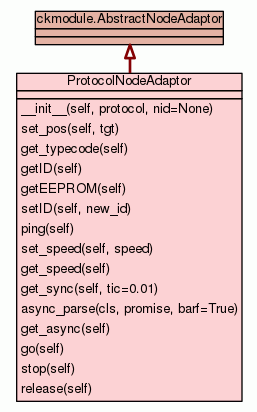
| Trees | Indices | Help |
|---|
|
|

Utilizes the protocol along with nid to create an interface for a specific module
|
|||
|
|||
|
|||
|
|||
|
|||
|
|||
|
|||
|
|||
|
|||
|
|||
|
|||
|
|||
|
|||
|
|||
|
|||
|
|||
|
Inherited from |
|||
|
|||
|
|||
|
|||
|
Inherited from |
|||
|
|||
x.__init__(...) initializes x; see help(type(x)) for signature
|
Get current module ID ... note: only works with single module bus OUTPUT: ret -- module ID |
Sets module ID ... note: only works with single module bus INPUT: new_id -- desired servo ID |
Set speed of for servo and get position INPUT: speed -- set speed |
Get speed value for servo ... this just returns the last speed set, if that has not been set, it returns the default value: 0xFF OUTPUT: ret -- servo speed between [0 - 255] |
Synchronous wrapper on top of get_async Returns the get_async result |
Parse the result of an asynchronous get. When barf is True, this may raise a deferred exception if the operation timed out or did not complete. Otherwise the exception object will be returned. |
Send out an asynchronous get request OUTPUT: ret -- promise that will hold result after update() |
Set servo to go state
... if module is in stop state it will immediately move to
position commanded
|
Set servo to stop state ... will freeze module motion until go state set or until power reset |
Release servo ... will turn on PID and make servo go slack |
| Trees | Indices | Help |
|---|
| Generated by Epydoc 3.0.1 on Thu Jan 4 16:46:17 2018 | http://epydoc.sourceforge.net |